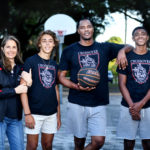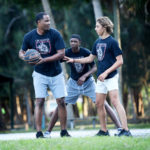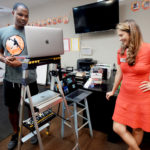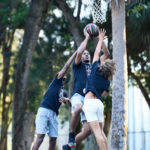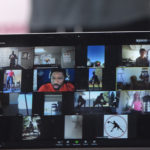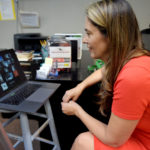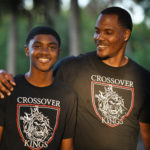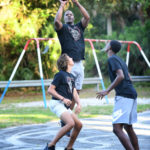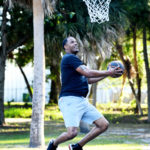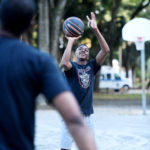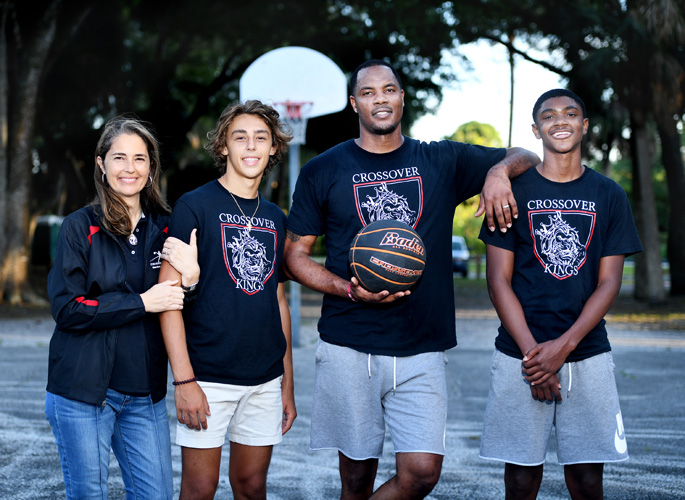
Like many area nonprofits, the COVID-19 pandemic has presented plenty of challenges to Crossover Mission, ultimately catapulting it into the virtual world.
Founded in 2014 by Antoine Jennings and Cathy De Schouwer, there are currently 70 elementary, middle and high school students in the program, which uses the game of basketball to entice at-risk students to improve academically through its mentoring program.
“We were all excited to get off for spring break, as were our kids, and that’s when everything hit,” De Schouwer recalled of the mid-March directive that required schools to go online.
“It was never an option for us to not be operational, because the need for academics is even stronger. They need a lot of guidance and accountability with respect to school. So the one-on-one tutoring has been really important, because many of them are home alone or with siblings.”
Instead of taking vacation, staff began making calls to parents and students to determine their needs – from computer needs, to where to pick up free school breakfasts and lunches.
The school district provided computers to those who needed one, but those computers did not allow access to Zoom, Crossover’s tutoring tool. As a result, Crossover scrounged up its own computers, laptops and iPads for the students to use.
Staff broke out the students, ages 8 to 18, into small manageable groups, each managed by a staff member and an academic mentor, many of whom had to learn the online mentoring technology.
“It took some effort to connect with the kids,” said De Schouwer. “Remember, they’re on spring break. They’re on holiday mindset, so they don’t really want to think about homeschooling.”
On March 30, when students would have been back at school, students, staff and tutors entered the Zoom world, where specific days and times had been established for each group.
After attendance and announcements, students and mentors share screens in separate Zoom breakout rooms. Because Crossover has an agency account, they can utilize such district applications as Focus, Canvas and iReady to access assignments and grades.
“When the mentor is with the student in the breakout room, they can actually look at the homework assignments; look at what’s been completed. It’s holding the students accountable,” De Schouwer explained. “They need somebody to say, ‘Make sure you get that done.’ This accountability factor has been tricky, really tricky.”
Continuing with athletics was equally important because, De Schouwer said, “kids are bored and they’re idle, going into malaise.”
Monday through Thursday, Jennings and coach Johnny Johnson hold virtual workouts – again broken out by age – teaching and assessing ball handling techniques, and Neal Watkins leads calisthenics workouts.
“We start out with calisthenics and then we immediately follow that with focusing on ball handling; like how many times they can dribble their right hand vs. their left hand,” Jennings explained. “We have a multiple gallery screen, and so we’ll demonstrate it first and the other coach watches the screen and makes sure the kids are doing it correctly.”
Jennings and Johnson also spend quality time playing online video games with students.
“If we have a large group there, we just have regular conversation on Zoom, where the kids can see each other and interact that way,” said Jennings. “We try to do that almost daily. That’s probably the kids’ favorite part.”
Motivational carrots have included being given a Crossover Mission basketball and/or participating in a video or podcast created by Watkins.
While Crossover is communicating with 100 percent of their students, not all are doing what they’re supposed to do.
“Some of the kids and the parents believe that this school year is a wash,” said Jennings. “They don’t really understand why it’s necessary that they continue to do the academics; not just with us, but even with the school district. A lot of the parents believe that their kids will be promoted regardless.”
“We have a demographic of kids where many of the parents don’t have a high school degree,” De Schouwer added. “Their own experience with school wasn’t great. They might not have the emphasis on academics that others would have.”
In some cases, students were embarrassed to admit they needed technological help, but after realizing that someone was willing to provide step-by-step instruction, they once again became engaged in the process.
“It’s been a real eye-opening experience. I’m very sure that a lot of our kids would be failing right now, because they just don’t want to do it, and they don’t know how to do it,” said De Schouwer. “They don’t have the motivation to do it when there’s not a parent or a teacher in the room with them saying, ‘OK, next thing is.’ They’re sleeping late and staying up all hours of the night. It’s sad; it’s a very strange time.”
Many of their parents are essential workers and have reached out for help in desperation.
“It’s very difficult. Parents are panicking in a lot of cases,” said De Schouwer, adding that Crossover has helped them navigate the system and communicate with the teachers.
Questions remain as to what will happen over the summer.
“Will they have summer school? We don’t know yet; they haven’t announced it,” said De Schouwer. “They have canceled all of the standardized tests, so that requirement is gone for the school year.”
They feel badly for their four seniors who are graduating without experiencing a prom or graduation.
“We’re very proud of them,” said De Schouwer. “Some of them have been challenged to graduate at all and they’re pushing very hard at this time to make sure that they do graduate.”
Moving forward, they have signed a lease purchase agreement and are in the first phase of repurposing a new facility. In the meantime, they are always looking for volunteers to be academic mentors.
For more information, visit crossovermission.com.
Photos by: Brenda Ahearn
Click HERE to see more or buy photos
- From left, Cathy De Schouwer, her son Louis, Antoine Jennings and his son Antoine Jr., at the basketball court on 39th Street in Gifford. Jennings is the founder of Crossover Mission and De Schouwer is the cofounder and executive director. Photo: Brenda Ahearn From left are Antoine Jennings, founder of Crossover Mission, his son Antoine Jr., ,and Louis De Schouwer, playing 21 on the court at 39th Street in Gifford. Antoine Jr., and Louis became friends through basketball which lead to their parents meeting in 2012. Photo: Brenda Ahearn Antoine Jennings and Cathy De Schouwer get talk as fellow coaches and kids join the Zoom virtual basketball training session on Monday, May 4. Due to COVID-19 both of the Crossover Mission’s basketball and academic mentoring have moved online. Photo: Brenda Ahearn Founder of Crossover Mission Antoine Jennings on the basketball court on 39th Street in Gifford, on Thursday, May 7. Photo: Brenda Ahearn Antoine Jennings, founder of Crossover Mission, his son Antoine Jr., ,and Louis De Schouwer, playing 21 on the court at 39th Street in Gifford. Photo: Brenda Ahearn Founder and Cofounder of Crossover Mission Antoine Jennings and Cathy De Schouwer laugh with students in the elementary level who have joined the Zoom mentoring session on Monday, May 4. Photo: Brenda Ahearn Detail of the Crossover Mission Zoom mentoring session on Monday evening, May 4. Photo: Brenda Ahearn Crossover Mission Cofounder and Executive Director Cathy De Shouwer checks in with elementary age students participating in the Monday evening mentoring session on May 4. Photo: Brenda Ahearn Antoine Jennings Jr., plays basketball with his father Founder of Crossover Mission Antoine Jennings on Thursday evening, May 7, at the basketball court on 39th Street in Gifford. Photo: Brenda Ahearn
- From left, Cathy De Schouwer, her son Louis, Antoine Jennings and his son Antoine Jr., at the basketball court on 39th Street in Gifford. Jennings is the founder of Crossover Mission and De Schouwer is the cofounder and executive director. Photo: Brenda Ahearn From left are Antoine Jennings, founder of Crossover Mission, his son Antoine Jr., ,and Louis De Schouwer, playing 21 on the court at 39th Street in Gifford. Antoine Jr., and Louis became friends through basketball which lead to their parents meeting in 2012. Photo: Brenda Ahearn Antoine Jennings and Cathy De Schouwer get talk as fellow coaches and kids join the Zoom virtual basketball training session on Monday, May 4. Due to COVID-19 both of the Crossover Mission’s basketball and academic mentoring have moved online. Photo: Brenda Ahearn Founder of Crossover Mission Antoine Jennings on the basketball court on 39th Street in Gifford, on Thursday, May 7. Photo: Brenda Ahearn Antoine Jennings, founder of Crossover Mission, his son Antoine Jr., ,and Louis De Schouwer, playing 21 on the court at 39th Street in Gifford. Photo: Brenda Ahearn Founder and Cofounder of Crossover Mission Antoine Jennings and Cathy De Schouwer laugh with students in the elementary level who have joined the Zoom mentoring session on Monday, May 4. Photo: Brenda Ahearn Detail of the Crossover Mission Zoom mentoring session on Monday evening, May 4. Photo: Brenda Ahearn Crossover Mission Cofounder and Executive Director Cathy De Shouwer checks in with elementary age students participating in the Monday evening mentoring session on May 4. Photo: Brenda Ahearn Antoine Jennings Jr., plays basketball with his father Founder of Crossover Mission Antoine Jennings on Thursday evening, May 7, at the basketball court on 39th Street in Gifford. Photo: Brenda Ahearn
- From left, Cathy De Schouwer, her son Louis, Antoine Jennings and his son Antoine Jr., at the basketball court on 39th Street in Gifford. Jennings is the founder of Crossover Mission and De Schouwer is the cofounder and executive director. Photo: Brenda Ahearn From left are Antoine Jennings, founder of Crossover Mission, his son Antoine Jr., ,and Louis De Schouwer, playing 21 on the court at 39th Street in Gifford. Antoine Jr., and Louis became friends through basketball which lead to their parents meeting in 2012. Photo: Brenda Ahearn Antoine Jennings and Cathy De Schouwer get talk as fellow coaches and kids join the Zoom virtual basketball training session on Monday, May 4. Due to COVID-19 both of the Crossover Mission’s basketball and academic mentoring have moved online. Photo: Brenda Ahearn Founder of Crossover Mission Antoine Jennings on the basketball court on 39th Street in Gifford, on Thursday, May 7. Photo: Brenda Ahearn Antoine Jennings, founder of Crossover Mission, his son Antoine Jr., ,and Louis De Schouwer, playing 21 on the court at 39th Street in Gifford. Photo: Brenda Ahearn Founder and Cofounder of Crossover Mission Antoine Jennings and Cathy De Schouwer laugh with students in the elementary level who have joined the Zoom mentoring session on Monday, May 4. Photo: Brenda Ahearn Detail of the Crossover Mission Zoom mentoring session on Monday evening, May 4. Photo: Brenda Ahearn Crossover Mission Cofounder and Executive Director Cathy De Shouwer checks in with elementary age students participating in the Monday evening mentoring session on May 4. Photo: Brenda Ahearn Antoine Jennings Jr., plays basketball with his father Founder of Crossover Mission Antoine Jennings on Thursday evening, May 7, at the basketball court on 39th Street in Gifford. Photo: Brenda Ahearn
- From left, Cathy De Schouwer, her son Louis, Antoine Jennings and his son Antoine Jr., at the basketball court on 39th Street in Gifford. Jennings is the founder of Crossover Mission and De Schouwer is the cofounder and executive director. Photo: Brenda Ahearn From left are Antoine Jennings, founder of Crossover Mission, his son Antoine Jr., ,and Louis De Schouwer, playing 21 on the court at 39th Street in Gifford. Antoine Jr., and Louis became friends through basketball which lead to their parents meeting in 2012. Photo: Brenda Ahearn Antoine Jennings and Cathy De Schouwer get talk as fellow coaches and kids join the Zoom virtual basketball training session on Monday, May 4. Due to COVID-19 both of the Crossover Mission’s basketball and academic mentoring have moved online. Photo: Brenda Ahearn Founder of Crossover Mission Antoine Jennings on the basketball court on 39th Street in Gifford, on Thursday, May 7. Photo: Brenda Ahearn Antoine Jennings, founder of Crossover Mission, his son Antoine Jr., ,and Louis De Schouwer, playing 21 on the court at 39th Street in Gifford. Photo: Brenda Ahearn Founder and Cofounder of Crossover Mission Antoine Jennings and Cathy De Schouwer laugh with students in the elementary level who have joined the Zoom mentoring session on Monday, May 4. Photo: Brenda Ahearn Detail of the Crossover Mission Zoom mentoring session on Monday evening, May 4. Photo: Brenda Ahearn Crossover Mission Cofounder and Executive Director Cathy De Shouwer checks in with elementary age students participating in the Monday evening mentoring session on May 4. Photo: Brenda Ahearn Antoine Jennings Jr., plays basketball with his father Founder of Crossover Mission Antoine Jennings on Thursday evening, May 7, at the basketball court on 39th Street in Gifford. Photo: Brenda Ahearn
- From left, Cathy De Schouwer, her son Louis, Antoine Jennings and his son Antoine Jr., at the basketball court on 39th Street in Gifford. Jennings is the founder of Crossover Mission and De Schouwer is the cofounder and executive director. Photo: Brenda Ahearn From left are Antoine Jennings, founder of Crossover Mission, his son Antoine Jr., ,and Louis De Schouwer, playing 21 on the court at 39th Street in Gifford. Antoine Jr., and Louis became friends through basketball which lead to their parents meeting in 2012. Photo: Brenda Ahearn Antoine Jennings and Cathy De Schouwer get talk as fellow coaches and kids join the Zoom virtual basketball training session on Monday, May 4. Due to COVID-19 both of the Crossover Mission’s basketball and academic mentoring have moved online. Photo: Brenda Ahearn Founder of Crossover Mission Antoine Jennings on the basketball court on 39th Street in Gifford, on Thursday, May 7. Photo: Brenda Ahearn Antoine Jennings, founder of Crossover Mission, his son Antoine Jr., ,and Louis De Schouwer, playing 21 on the court at 39th Street in Gifford. Photo: Brenda Ahearn Founder and Cofounder of Crossover Mission Antoine Jennings and Cathy De Schouwer laugh with students in the elementary level who have joined the Zoom mentoring session on Monday, May 4. Photo: Brenda Ahearn Detail of the Crossover Mission Zoom mentoring session on Monday evening, May 4. Photo: Brenda Ahearn Crossover Mission Cofounder and Executive Director Cathy De Shouwer checks in with elementary age students participating in the Monday evening mentoring session on May 4. Photo: Brenda Ahearn Antoine Jennings Jr., plays basketball with his father Founder of Crossover Mission Antoine Jennings on Thursday evening, May 7, at the basketball court on 39th Street in Gifford. Photo: Brenda Ahearn
- From left, Cathy De Schouwer, her son Louis, Antoine Jennings and his son Antoine Jr., at the basketball court on 39th Street in Gifford. Jennings is the founder of Crossover Mission and De Schouwer is the cofounder and executive director. Photo: Brenda Ahearn From left are Antoine Jennings, founder of Crossover Mission, his son Antoine Jr., ,and Louis De Schouwer, playing 21 on the court at 39th Street in Gifford. Antoine Jr., and Louis became friends through basketball which lead to their parents meeting in 2012. Photo: Brenda Ahearn Antoine Jennings and Cathy De Schouwer get talk as fellow coaches and kids join the Zoom virtual basketball training session on Monday, May 4. Due to COVID-19 both of the Crossover Mission’s basketball and academic mentoring have moved online. Photo: Brenda Ahearn Founder of Crossover Mission Antoine Jennings on the basketball court on 39th Street in Gifford, on Thursday, May 7. Photo: Brenda Ahearn Antoine Jennings, founder of Crossover Mission, his son Antoine Jr., ,and Louis De Schouwer, playing 21 on the court at 39th Street in Gifford. Photo: Brenda Ahearn Founder and Cofounder of Crossover Mission Antoine Jennings and Cathy De Schouwer laugh with students in the elementary level who have joined the Zoom mentoring session on Monday, May 4. Photo: Brenda Ahearn Detail of the Crossover Mission Zoom mentoring session on Monday evening, May 4. Photo: Brenda Ahearn Crossover Mission Cofounder and Executive Director Cathy De Shouwer checks in with elementary age students participating in the Monday evening mentoring session on May 4. Photo: Brenda Ahearn Antoine Jennings Jr., plays basketball with his father Founder of Crossover Mission Antoine Jennings on Thursday evening, May 7, at the basketball court on 39th Street in Gifford. Photo: Brenda Ahearn
- From left, Cathy De Schouwer, her son Louis, Antoine Jennings and his son Antoine Jr., at the basketball court on 39th Street in Gifford. Jennings is the founder of Crossover Mission and De Schouwer is the cofounder and executive director. Photo: Brenda Ahearn From left are Antoine Jennings, founder of Crossover Mission, his son Antoine Jr., ,and Louis De Schouwer, playing 21 on the court at 39th Street in Gifford. Antoine Jr., and Louis became friends through basketball which lead to their parents meeting in 2012. Photo: Brenda Ahearn Antoine Jennings and Cathy De Schouwer get talk as fellow coaches and kids join the Zoom virtual basketball training session on Monday, May 4. Due to COVID-19 both of the Crossover Mission’s basketball and academic mentoring have moved online. Photo: Brenda Ahearn Founder of Crossover Mission Antoine Jennings on the basketball court on 39th Street in Gifford, on Thursday, May 7. Photo: Brenda Ahearn Antoine Jennings, founder of Crossover Mission, his son Antoine Jr., ,and Louis De Schouwer, playing 21 on the court at 39th Street in Gifford. Photo: Brenda Ahearn Founder and Cofounder of Crossover Mission Antoine Jennings and Cathy De Schouwer laugh with students in the elementary level who have joined the Zoom mentoring session on Monday, May 4. Photo: Brenda Ahearn Detail of the Crossover Mission Zoom mentoring session on Monday evening, May 4. Photo: Brenda Ahearn Crossover Mission Cofounder and Executive Director Cathy De Shouwer checks in with elementary age students participating in the Monday evening mentoring session on May 4. Photo: Brenda Ahearn Antoine Jennings Jr., plays basketball with his father Founder of Crossover Mission Antoine Jennings on Thursday evening, May 7, at the basketball court on 39th Street in Gifford. Photo: Brenda Ahearn
- From left, Cathy De Schouwer, her son Louis, Antoine Jennings and his son Antoine Jr., at the basketball court on 39th Street in Gifford. Jennings is the founder of Crossover Mission and De Schouwer is the cofounder and executive director. Photo: Brenda Ahearn From left are Antoine Jennings, founder of Crossover Mission, his son Antoine Jr., ,and Louis De Schouwer, playing 21 on the court at 39th Street in Gifford. Antoine Jr., and Louis became friends through basketball which lead to their parents meeting in 2012. Photo: Brenda Ahearn Antoine Jennings and Cathy De Schouwer get talk as fellow coaches and kids join the Zoom virtual basketball training session on Monday, May 4. Due to COVID-19 both of the Crossover Mission’s basketball and academic mentoring have moved online. Photo: Brenda Ahearn Founder of Crossover Mission Antoine Jennings on the basketball court on 39th Street in Gifford, on Thursday, May 7. Photo: Brenda Ahearn Antoine Jennings, founder of Crossover Mission, his son Antoine Jr., ,and Louis De Schouwer, playing 21 on the court at 39th Street in Gifford. Photo: Brenda Ahearn Founder and Cofounder of Crossover Mission Antoine Jennings and Cathy De Schouwer laugh with students in the elementary level who have joined the Zoom mentoring session on Monday, May 4. Photo: Brenda Ahearn Detail of the Crossover Mission Zoom mentoring session on Monday evening, May 4. Photo: Brenda Ahearn Crossover Mission Cofounder and Executive Director Cathy De Shouwer checks in with elementary age students participating in the Monday evening mentoring session on May 4. Photo: Brenda Ahearn Antoine Jennings Jr., plays basketball with his father Founder of Crossover Mission Antoine Jennings on Thursday evening, May 7, at the basketball court on 39th Street in Gifford. Photo: Brenda Ahearn
- From left, Cathy De Schouwer, her son Louis, Antoine Jennings and his son Antoine Jr., at the basketball court on 39th Street in Gifford. Jennings is the founder of Crossover Mission and De Schouwer is the cofounder and executive director. Photo: Brenda Ahearn From left are Antoine Jennings, founder of Crossover Mission, his son Antoine Jr., ,and Louis De Schouwer, playing 21 on the court at 39th Street in Gifford. Antoine Jr., and Louis became friends through basketball which lead to their parents meeting in 2012. Photo: Brenda Ahearn Antoine Jennings and Cathy De Schouwer get talk as fellow coaches and kids join the Zoom virtual basketball training session on Monday, May 4. Due to COVID-19 both of the Crossover Mission’s basketball and academic mentoring have moved online. Photo: Brenda Ahearn Founder of Crossover Mission Antoine Jennings on the basketball court on 39th Street in Gifford, on Thursday, May 7. Photo: Brenda Ahearn Antoine Jennings, founder of Crossover Mission, his son Antoine Jr., ,and Louis De Schouwer, playing 21 on the court at 39th Street in Gifford. Photo: Brenda Ahearn Founder and Cofounder of Crossover Mission Antoine Jennings and Cathy De Schouwer laugh with students in the elementary level who have joined the Zoom mentoring session on Monday, May 4. Photo: Brenda Ahearn Detail of the Crossover Mission Zoom mentoring session on Monday evening, May 4. Photo: Brenda Ahearn Crossover Mission Cofounder and Executive Director Cathy De Shouwer checks in with elementary age students participating in the Monday evening mentoring session on May 4. Photo: Brenda Ahearn Antoine Jennings Jr., plays basketball with his father Founder of Crossover Mission Antoine Jennings on Thursday evening, May 7, at the basketball court on 39th Street in Gifford. Photo: Brenda Ahearn
- From left, Cathy De Schouwer, her son Louis, Antoine Jennings and his son Antoine Jr., at the basketball court on 39th Street in Gifford. Jennings is the founder of Crossover Mission and De Schouwer is the cofounder and executive director. Photo: Brenda Ahearn From left are Antoine Jennings, founder of Crossover Mission, his son Antoine Jr., ,and Louis De Schouwer, playing 21 on the court at 39th Street in Gifford. Antoine Jr., and Louis became friends through basketball which lead to their parents meeting in 2012. Photo: Brenda Ahearn Antoine Jennings and Cathy De Schouwer get talk as fellow coaches and kids join the Zoom virtual basketball training session on Monday, May 4. Due to COVID-19 both of the Crossover Mission’s basketball and academic mentoring have moved online. Photo: Brenda Ahearn Founder of Crossover Mission Antoine Jennings on the basketball court on 39th Street in Gifford, on Thursday, May 7. Photo: Brenda Ahearn Antoine Jennings, founder of Crossover Mission, his son Antoine Jr., ,and Louis De Schouwer, playing 21 on the court at 39th Street in Gifford. Photo: Brenda Ahearn Founder and Cofounder of Crossover Mission Antoine Jennings and Cathy De Schouwer laugh with students in the elementary level who have joined the Zoom mentoring session on Monday, May 4. Photo: Brenda Ahearn Detail of the Crossover Mission Zoom mentoring session on Monday evening, May 4. Photo: Brenda Ahearn Crossover Mission Cofounder and Executive Director Cathy De Shouwer checks in with elementary age students participating in the Monday evening mentoring session on May 4. Photo: Brenda Ahearn Antoine Jennings Jr., plays basketball with his father Founder of Crossover Mission Antoine Jennings on Thursday evening, May 7, at the basketball court on 39th Street in Gifford. Photo: Brenda Ahearn
- From left, Cathy De Schouwer, her son Louis, Antoine Jennings and his son Antoine Jr., at the basketball court on 39th Street in Gifford. Jennings is the founder of Crossover Mission and De Schouwer is the cofounder and executive director. Photo: Brenda Ahearn From left are Antoine Jennings, founder of Crossover Mission, his son Antoine Jr., ,and Louis De Schouwer, playing 21 on the court at 39th Street in Gifford. Antoine Jr., and Louis became friends through basketball which lead to their parents meeting in 2012. Photo: Brenda Ahearn Antoine Jennings and Cathy De Schouwer get talk as fellow coaches and kids join the Zoom virtual basketball training session on Monday, May 4. Due to COVID-19 both of the Crossover Mission’s basketball and academic mentoring have moved online. Photo: Brenda Ahearn Founder of Crossover Mission Antoine Jennings on the basketball court on 39th Street in Gifford, on Thursday, May 7. Photo: Brenda Ahearn Antoine Jennings, founder of Crossover Mission, his son Antoine Jr., ,and Louis De Schouwer, playing 21 on the court at 39th Street in Gifford. Photo: Brenda Ahearn Founder and Cofounder of Crossover Mission Antoine Jennings and Cathy De Schouwer laugh with students in the elementary level who have joined the Zoom mentoring session on Monday, May 4. Photo: Brenda Ahearn Detail of the Crossover Mission Zoom mentoring session on Monday evening, May 4. Photo: Brenda Ahearn Crossover Mission Cofounder and Executive Director Cathy De Shouwer checks in with elementary age students participating in the Monday evening mentoring session on May 4. Photo: Brenda Ahearn Antoine Jennings Jr., plays basketball with his father Founder of Crossover Mission Antoine Jennings on Thursday evening, May 7, at the basketball court on 39th Street in Gifford. Photo: Brenda Ahearn
- From left, Cathy De Schouwer, her son Louis, Antoine Jennings and his son Antoine Jr., at the basketball court on 39th Street in Gifford. Jennings is the founder of Crossover Mission and De Schouwer is the cofounder and executive director. Photo: Brenda Ahearn From left are Antoine Jennings, founder of Crossover Mission, his son Antoine Jr., ,and Louis De Schouwer, playing 21 on the court at 39th Street in Gifford. Antoine Jr., and Louis became friends through basketball which lead to their parents meeting in 2012. Photo: Brenda Ahearn Antoine Jennings and Cathy De Schouwer get talk as fellow coaches and kids join the Zoom virtual basketball training session on Monday, May 4. Due to COVID-19 both of the Crossover Mission’s basketball and academic mentoring have moved online. Photo: Brenda Ahearn Founder of Crossover Mission Antoine Jennings on the basketball court on 39th Street in Gifford, on Thursday, May 7. Photo: Brenda Ahearn Antoine Jennings, founder of Crossover Mission, his son Antoine Jr., ,and Louis De Schouwer, playing 21 on the court at 39th Street in Gifford. Photo: Brenda Ahearn Founder and Cofounder of Crossover Mission Antoine Jennings and Cathy De Schouwer laugh with students in the elementary level who have joined the Zoom mentoring session on Monday, May 4. Photo: Brenda Ahearn Detail of the Crossover Mission Zoom mentoring session on Monday evening, May 4. Photo: Brenda Ahearn Crossover Mission Cofounder and Executive Director Cathy De Shouwer checks in with elementary age students participating in the Monday evening mentoring session on May 4. Photo: Brenda Ahearn Antoine Jennings Jr., plays basketball with his father Founder of Crossover Mission Antoine Jennings on Thursday evening, May 7, at the basketball court on 39th Street in Gifford. Photo: Brenda Ahearn

